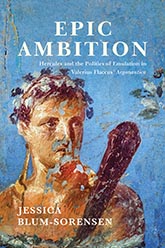|
Epic Ambition
Hercules and the Politics of Emulation in Valerius Flaccus' Argonautica
Jessica Blum-Sorensen
Wisconsin Studies in Classics Imprint
“This exciting new study of Valerius Flaccus’ Argonautica brings out the richness of this often underrated poem, showing its political sophistication and its importance for understanding the culture of Roman exemplarity. Anyone interested in Roman epic and its development should read this for an astute overview of the generic complexity and a balanced assessment of Valerius’ politics.”
—Helen Lovatt, author of The Epic Gaze: Vision, Gender and Narrative in Ancient Epic
Why did Valerius Flaccus create his epic Argonautica?
By the time the Roman poet Valerius Flaccus wrote in the first century CE, the tale of Jason and his famous ship the Argo had been retold so often it was a byword for poetic banality. Why, then, did Valerius construct his epic Argonautica? In this innovative analysis, Jessica Blum-Sorensen argues that it was precisely the myth’s overplayed nature that appealed to Valerius, operating in and responding to a period of social and political upheaval. Seeking to comment obliquely on Roman reliance on mythic exempla to guide action and expected outcomes, there was no better vessel for his social and political message than the familiar Argo.
Focusing especially on Hercules, Blum-Sorensen explores how Valerius’ characters—and, by extension, their Roman audience—misinterpret exemplars of past achievement, or apply them to sad effect in changed circumstances. By reading such models as normative guides to epic triumph, Valerius’ Argonauts find themselves enacting tragic outcomes: effectively, the characters impose their nostalgic longing for epic triumph on the events before them, even as Valerius and his audience anticipate the tragedy awaiting his heroes. Valerius thus questions Rome’s reliance on the past as a guide to the present, allowing for doubt about the empire’s success under the new Flavian regime. It is the literary tradition’s exchange between triumphant epic and tragedy that makes the Argo’s voyage a perfect vehicle for Valerius’ exploration: the tensions between genres both raise and prohibit resolution of anxieties about how the new age—mythological or real—will turn out.
 Jessica Blum-Sorensen is an associate professor and program director of Classical studies at the University of San Francisco. She is coeditor, with Thomas Biggs, of The Epic Journey in Greek and Roman Literature.
Jessica Blum-Sorensen is an associate professor and program director of Classical studies at the University of San Francisco. She is coeditor, with Thomas Biggs, of The Epic Journey in Greek and Roman Literature.
Jessica Blum-Sorensen's Academic Webpage - https://usfca.academia.edu/JessicaBlum
Praise
“Blum-Sorensen’s focus on the ambivalence of mimetic behavior allows for a middle path between optimistic and pessimistic readings of Valerius’ Argonautica. This is an original and compelling interpretation, one that enhances our understanding of Valerius’ text and the politics of Latin epic more broadly.”
—Tim Stover, author of Epic and Empire in Vespasianic Rome: A New Reading of Valerius Flaccus’ Argonautica
“An extraordinary, seminal, and thought-provoking work of ground-breaking and meticulous scholarship. . . . Welcome, unique, singular.”
—Midwest Book Review
Table of Contents
Contents
Acknowledgments
Introduction
1. Conflicting Agendas
2. Hercules in the Jovian Age
3. Exemplary Translation
4. Juno’s Tragedy
5. Mistaken Identities
6. Through the Looking Glass
7. Rome Refracted
Conclusion
References
Index
Index Locorum
|

Larger images
December 2023
338 pp. 6 x 9
|

